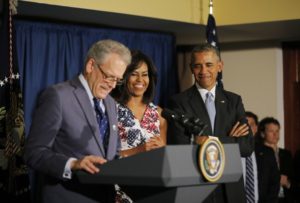
President Barack Obama on Tuesday nominated Jeffrey DeLaurentis be the first U.S. ambassador to Cuba since the two countries broke off relations 55 years ago. The appointment would be a promotion for DeLaurentis, who’s been the U.S. chief of mission in Havana since 2014, paving the way for Obama’s initiative to normalize relations with Cuba last year before his visit to the island nation in March.
Obama called the nomination “a common sense step forward toward a more normal and productive relationship between our two countries.” But the appointment must be approved by the Republican-led Senate, where Cuban-American Sens. Marco Rubio of Florida and Ted Cruz of Texas have said they would oppose naming any ambassador, arguing that President Raúl Castro hasn’t begun real reform.
In a statement early Tuesday evening, Rubio said that Obama had “failed the Cuban people” and that “this nomination should go nowhere.” Other senators immediately voiced support for the nomination. Republican Jeff Flake of Arizona — a member of the Foreign Relations Committee, which would hold confirmation hearings for DeLaurentis — said Americans and business operators would be “well-served” by the appointment.
Tom Udall of New Mexico, a Democratic member of the committee, said DeLaurentis was “well-qualified to help guide our unfolding relationship with Cuba” and urged other senators “not to continue their pattern of blocking nominees and leaving key positions unfilled.” And Democrat Pat Leahy of Vermont called DeLaurentis “the obvious choice.”
DeLaurentis, a former deputy assistant secretary of state for of Western Hemisphere Affairs, would be the first full ambassador to Havana since October 1960, when Philip W. Bonsal left the post, which was terminated three months later after President Dwight D. Eisenhower severed U.S. relations in response to Fidel Castro’s communist revolution. The announcement comes two weeks after representatives of both countries held their first official bilateral economic talks in Washington to work out trade and other issues following normalization of relations.

Recent Comments